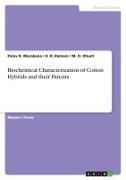Read more
Master's Thesis from the year 2022 in the subject Chemistry - Bio-chemistry, , course: biochem-599 - Agriculture, language: English, abstract: Unlock the secrets hidden within the genetic tapestry of cotton! Venture into the intricate world of Gossypium hirsutum and discover the biochemical keys that unlock superior hybrid vigor. This groundbreaking work meticulously dissects the biochemical composition of cotton hybrids and their parent lines, revealing the subtle yet significant differences that drive yield and fiber quality. Explore a comprehensive analysis of key biochemical parameters, including reducing sugar, total soluble sugar, protein content, proline levels, tannin concentrations, gossypol percentages, total phenol content, flavanol measurements, iodine value, and seed oil content. Through rigorous experimentation and detailed analysis, this study unveils the intricate relationships between these biochemical markers and crucial agronomic traits, providing invaluable insights for cotton breeders and researchers alike. Delve into the methodologies employed, from experimental design to precise biochemical assays, ensuring reproducibility and reliability of the findings. Discover how these biochemical fingerprints can be used to identify superior genotypes, optimize breeding strategies, and ultimately enhance cotton production. This research not only illuminates the biochemical underpinnings of hybrid cotton performance but also paves the way for developing climate-resilient and high-yielding varieties, addressing the growing global demand for this essential crop. Whether you're a seasoned cotton breeder, a plant biochemist, or simply fascinated by the science of crop improvement, this book offers a compelling journey into the heart of cotton genetics and the future of sustainable agriculture, offering a comprehensive understanding of cotton breeding through biochemical characterization, and pushing the boundaries of agricultural innovation.

